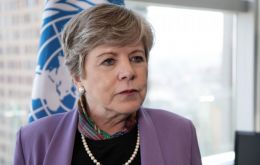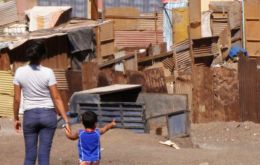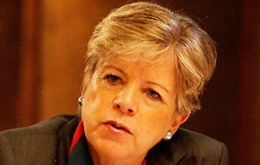MercoPress. South Atlantic News Agency
Tag: UN Economic Commission for Latin America and the Caribbean (ECLAC)
-
Monday, September 5th 2022 - 18:07 UTC
ECLAC's new boss appointed

Costa Rican economist José Manuel Salazar-Xirinachs has been chosen to replace Mexican diplomat Alicia Bárcena at the helm of the ECLAC after 14 years on the job, it was announced. Salazar took the oath of office before UN Secretary-General Antonio Guterres.
-
Friday, August 6th 2021 - 07:34 UTC
Latin America and Caribbean FDI in 2020 was the lowest since 2010, ECLAC annual report

Latin America and the Caribbean received US$105.48 billion in Foreign Direct Investment, FDI, in 2020 – 34.7% less than in 2019, 51% less than the record high achieved in 2012, and the lowest since 2010, the Economic Commission for Latin America and the Caribbean (ECLAC) indicated during the presentation of the annual “Foreign Direct Investment in Latin America and the Caribbean, 2021”
-
Tuesday, January 2nd 2018 - 06:20 UTC
Latin American poverty and extreme poverty rose in 2015/16 following a decade of decline

Poverty and extreme poverty levels rose in Latin America as a regional average in 2015 and 2016, after more than a decade of declines in the majority of countries, while in 2017 they are expected to hold steady, the Economic Commission for Latin America and the Caribbean (ECLAC) said.
-
Tuesday, October 6th 2015 - 07:40 UTC
Latin America forecasted to contract 0.3% this year and 0.7% growth in 2016

The United Nations Economic Commission for Latin America and the Caribbean, ECLAC, forecasted a downward trend in the region’s economic activity for 2015 to -0.3% from 0.5%, and estimates that for 2016 growth will be close to 0.7%.
-
Tuesday, March 10th 2015 - 06:46 UTC
ECLAC estimates 28% of Latin America's population live in poverty

Poverty affected 28% of Latin America’s population in 2014, revealing that its decline has stalled at around that level since 2012, while indigence rose to 12.0% from 11.3% during the same two-year period in an overall context of economic deceleration, according to the projections from a study released by the Economic Commission for Latin America and the Caribbean (ECLAC) in Santiago, Chile.
-
Tuesday, November 11th 2014 - 21:54 UTC
An estimated 28.5m from Latam and Caribbean population live overseas, 70% in USA

An estimated 28.5 million Latin American and Caribbean people live outside their birth countries, 70% of them in the United States, while a majority of the immigrant population of 7.6 million originated from other countries in the region, according to a new study by the Economic Commission for Latin America and the Caribbean (ECLAC).
-
Wednesday, October 15th 2014 - 08:36 UTC
Latin America with a huge deficit in infrastructure investment, says Eclac

Argentina should double its current investment in infrastructure and spend 6.2% of its Gross Domestic Product to satisfy its demands for the period 2012-2020, according to a report of the UN Economic Commission for Latin America and the Caribbean (ECLAC).
-
Friday, October 10th 2014 - 05:01 UTC
Latam headed for a third year of foreign trade stagnation, reports ECLAC

Latin America and the Caribbean's foreign trade will experience its third year of stagnation in 2014, because of minimal growth in exports and a slight decline in imports, the Economic Commission for Latin America and the Caribbean (ECLAC) reported on Thursday.
-
Tuesday, August 5th 2014 - 06:50 UTC
Barcena anticipates that Argentina will probably have negative growth in 2014

Argentina's economy probably will contract in 2014, the head of the United Nation's body for Latin America and the Caribbean, ECLAC said on Monday, as fallout from a new sovereign debt crisis will keep the country out of money markets.
-
Monday, July 7th 2014 - 23:09 UTC
ECLAC sides with Argentina; calls for Collective Action Clause for sovereign debts

The Executive Secretary of the Economic Commission for Latin America and the Caribbean (ECLAC), Alicia Bárcena, has sided with Argentina in the holdout hedge funds litigation arguing on the need to establish an international mechanism that would allow for the resolution of conflicts of interest caused by sovereign defaults:
